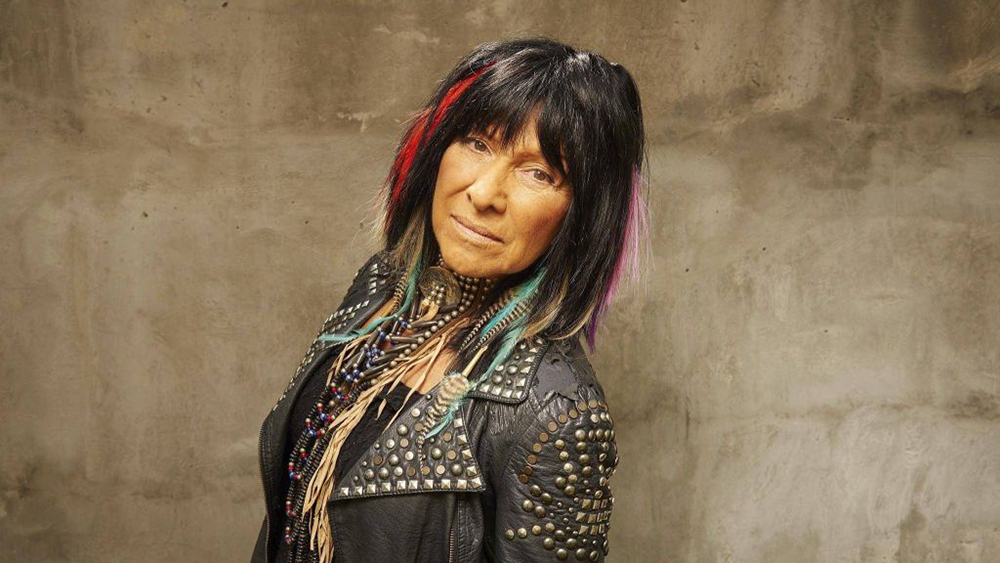Buffy Sainte-Marie Stripped of Order of Canada
Oscar-winning songwriter and Canadian Music Hall of Fame inductee Buffy Sainte-Marie, known for the anti-war song “Universal Soldier” and stolen-land lament “Now That the Buffalo’s Gone,” has had her prestigious Order of Canada appointment terminated, the Toronto Star reported late Friday. The award is the country’s highest honor presented to a civilian.
“Notice is hereby given that the appointment of Buffy Sainte-Marie to the Order of Canada was terminated by Ordinance signed by the Governor General [Mary Simon] on January 3, 2025.” The notice was given by Ken MacKillop, Secretary General of the Order of Canada.
No specific reason for the termination was stated, but an investigation by the Canadian Broadcasting Corporation’s “Fifth Estate” show, published on Oct. 27, 2023 and now viewed on YouTube 1.5 million times, alleges that Sainte-Marie fabricated her Indigeneity, and presented a birth certificate shown on camera listing Boston, Mass. as her place of birth, “color of race” as “white,” and birth name as Beverly Jean Santamaria.
A representative of the Office of the Secretary to the Governor General told Variety via email, “The Office of the Secretary to the Governor General does not comment on the specifics of termination cases,” but pointed to the organization’s web site, which reads in part: “The recommendation of the Advisory Council shall be based on evidence and guided by the principle of fairness and shall only be made after the Council has ascertained the facts it considers relevant.” The rep noted that since its creation in 1967, more than 7,600 people from all sectors have been invested into the Order. Terminations are rare; just eight people to date.
Saint-Marie, who turns 84 on Feb. 20, has spent six decades as a musician and activist, releasing 16 studio albums whose songs often address war and Indigenous rights. Her latest was 2017’s “Medicine Songs,” containing new and re-recordings of older material.
Biographical information supplied by her team over the years states that she was born on the Piapot Cree First Nations Reserve in Qu’Appelle Valley, Saskatchewan. Her 2018 authorized biography also states she was likely born Cree, while her web siteonce said that she is “believed to have been born in 1941 on the Piapot First Nation reserve in Saskatchewan and taken from her biological parents when she was an infant.”
The “Sixties Scoop” is a dark period in Canadian history in which policies allowed for Indigenous children to be taken without consent from their birth families and adopted by white families. Sainte-Marie has frequently said she does not know where she was born and does not have her birth certificate, but was adopted by the Santamaria’s in America. In her early 20s, she was formally adopted into the Piapot family of the Piapot First Nation.
However, the investigation by Fifth Estate (a “60 Minutes”-style news program) unearthed information that alleges Sainte-Marie is Italian-American and that she threatened family members to hide that information when she launched her music career in the 1960s. Family members were interviewed as part of the CBC investigation.
A much-beloved figure in Canada, the report caused a split in support, some dismissing the information, others pointing to the good Sainte-Marie has done over her lifetime, while others condemned her for being a “pretendian,” the name given to a person claiming to be Indigenous or have Indigenous heritage.
On Oct. 26, 2023, Sainte-Marie issued a lengthy statement following the Fifth Estate report, with the headline “My Truth as I Know It,” calling them “deeply hurtful allegations” and stating “I have always struggled to answer questions who I am.” She maintains she is “proud of my Indigneous-American identity, and the deep ties I have to Canada and my Piapot family.” She explains “what I know about my Indigneous ancestry I learned from my mother” and concludes with “I may not known where I was born, but I know who I am.”
Major music bodies in Canada which have honored Sainte-Marie throughout her career have not revoked her awards.
She has won seven Juno Awards, the country’s equivalent of a Grammy, including 1997’s Best Music of Aboriginal Canada Recording, as it was called then, 2009’s Aboriginal Recording of the Year, 2016’s Aboriginal Album of the Year and 2018’s Indigenous Music Album of the Year.
In 1995, the Juno Awards inducted her into the Canadian Music Hall of Fame and in 2017 gave her the Humanitarian Award. The Canadian Academy of Recording Arts & Sciences (CARAS) did not respond to Variety’s request for comment about these recent developments and if her awards still stand.
The Canadian Songwriters Hall of Fame also inducted Sainte-Marie in 2019. Her song “Universal Soldier” was inducted in 2005. Her official bio at that time, still on the CSHF web site, reads, “Born into a Cree family on the Piapot First Nation in Saskatchewan in 1941, Beverly Sainte-Marie was raised by relatives in the Eastern USA.”
In 2015, she won Canada’s prestigious Polaris Music Prize for her album, “Power in the Blood,” voted on by members of the music media.
In 2021, Canada Post issued a commemorative stamp of Sainte-Marie and the following year the Toronto International Film Festival premiered the documentary “Buffy Sainte-Marie: Carry It,” directed by Madison Thomas, which won a 2023 International Emmy Award, and two Canadian Screen Awards.
On Nov. 3, 2023, after its own examination of the Fifth Estate’s findings, Sixties Scoop Healing Foundation, stood by Sainte-Marie, outlining its decision in a statement. “The SSHF Board of Directors, Chief Executive Officer and Staff unanimously stand by Buffy Sainte-Marie as an ally and advocate for the Sixties Scoop Survivor constituents of the Foundation, whether or not she is herself an actual Sixties Scoop Survivor,” it concludes, signed by the Board of Directors and CEO.


